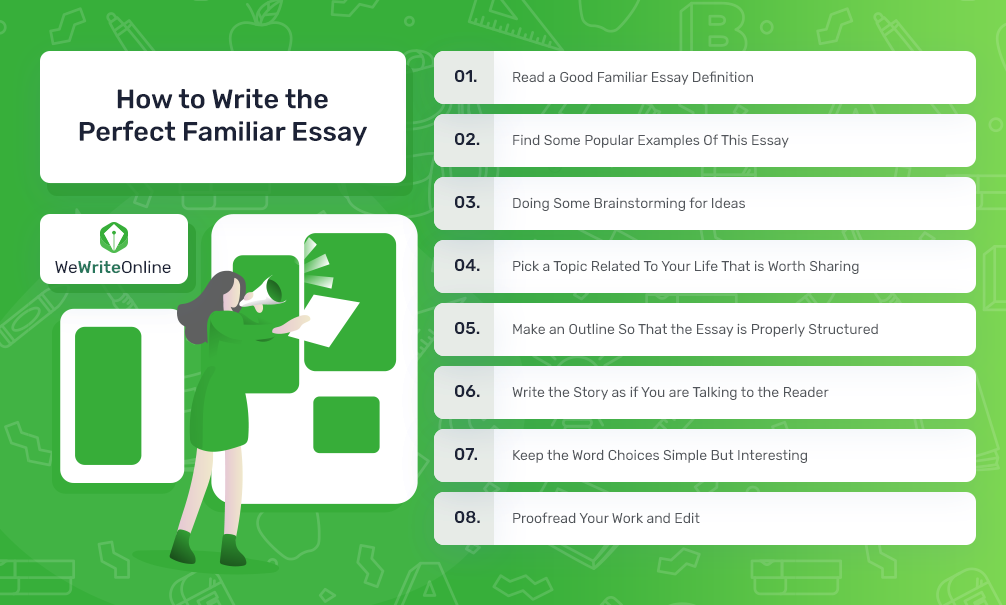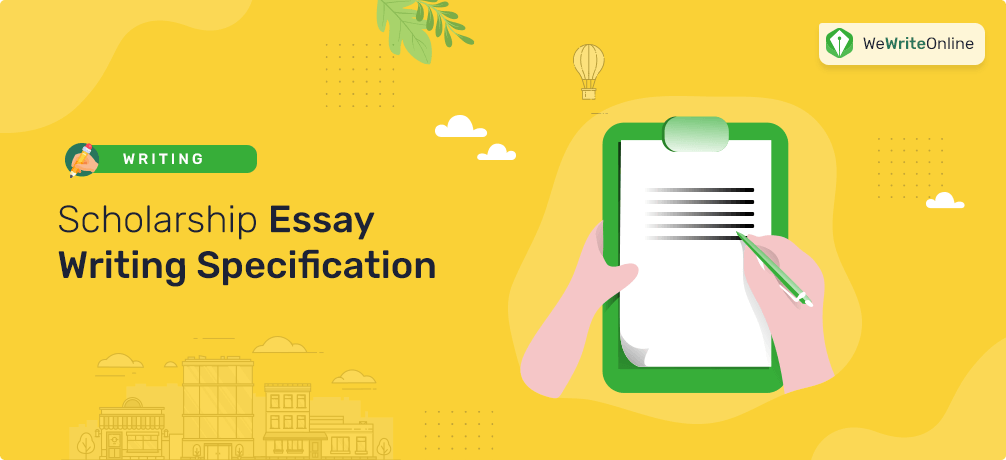What is a Familiar Essay in Composition?
Definition and Examples
- An Introduction to Punctuation
- Ph.D., Rhetoric and English, University of Georgia
- M.A., Modern English and American Literature, University of Leicester
- B.A., English, State University of New York
A familiar essay is a short prose composition (a type of creative nonfiction ) characterized by the personal quality of the writing and the distinctive voice or persona of the essayist. Also known as an informal essay .
"The subject matter," says G. Douglas Atkins, "largely makes the familiar essay what it is: it is recognizable by human being qua human being, shared by her and him, and common to us all, requiring no arcane, specialized, or professional knowledge—an amateur's haven" ( On the Familiar Essay: Challenging Academic Orthodoxies , 2009).
Highly regarded familiar essayists in English include Charles Lamb , Virginia Woolf, George Orwell , James Baldwin, E.B. White , Joan Didion, Annie Dillard, Alice Walker , and Richard Rodriguez .

Examples of Classic Familiar Essays
- Blakesmoor in H-----shire, by Charles Lamb
- Crooked Streets, by Hilaire Belloc
- Going Out for a Walk, by Max Beerbohm
- Getting Up on Cold Mornings, by Leigh Hunt
- On Going a Journey, by William Hazlitt
- The Town Week by E.V. Lucas
Observation
- "Post-Montaigne, the essay split into two distinct modalities: one remained informal, personal, intimate, relaxed, conversational, and often humorous; the other, dogmatic, impersonal, systematic, and expository ." (Michele Richman in The Barthes Effect by R. Bensmaia. Univ. of Minnesota Press, 1987)
Familiar Essays and Familiar Essayists
- - " Familiar essays . . . have traditionally been highly informal in tone , often humorous, valuing lightness of touch above all else. They have been filled with intimate personal observations and reflections, and have emphasized the concrete and tangible, the sensual enjoyment of everyday pleasures. . . .
- "Nowadays the familiar essay is often seen as a form particularly well suited to modern rhetorical purposes, able to reach an otherwise suspicious or uninterested audience through personal discourse , which reunites the appeals of ethos (the force and charm of the writer's character) and pathos (the emotional engagement of the reader) with the intellectual appeal of logos ." (Dan Roche, "Familiar Essay." Encyclopedia of the Essay , ed. by Tracy Chevalier. Fitzroy Dearborn, 1997)
- - "[T]he familiar essayist lives, and takes his professional sustenance, in the everyday flow of things. Familiar is his style and familiar, too, is the territory he writes about. . . .
- "In the end the true job of the familiar essayist is to write what is on his mind and in his heart in the hope that, in doing so, he will say what others have sensed only inchoately." (Joseph Epstein, preface to Familiar Territory: Observations on American Life . Oxford University Press, 1979)
Familiar Essays and Personal Essays
- " [Francis] Bacon 's influence continues today, often in familiar essays , whereas [Michel de] Montaigne's enjoys greater popularity as personal essays . The difference is neither precious nor sophistical, although it is subtle. Although the personal and the familiar are the two main sorts of essays, essays are, truth to tell, often both familiar and personal, the difference at least nowadays residing mainly in the degree to which a particular instance emphasizes the tiny prepositions that we find in Montaigne and Bacon alike: 'on' and 'of.' If the essay tips toward being about a topic--books, say, or solitude--it may be termed 'familiar,' whereas if it focuses a bit less on the general or universal and more on the character of 'the speaking voice,' it is likely a 'personal' essay." (G. Douglas Atkins, Reading Essays: An Invitation . University of Georgia Press, 2007)
Revival of the Familiar Essay
- "Equally problematic are conventional divisions of the essay into formal and informal, impersonal and familiar , expository and conversational . Though imprecise and potentially contradictory, such labels not only serve as a form of critical shorthand but also point to what is often the most powerful organizing force in the essay: the rhetorical voice or projected character [ ethos ] of the essayist. . . .
- "The modernist era, that period of fragmentation and innovation at the beginning of the 20th century, is best known to students of literature for the radical transformations that occurred in poetry and fiction. But the essay, too, experienced dramatic changes during this time. Divested of its self-conscious literariness and reinvested with the colloquial vigor of popular journalism, the essay was reborn in such cosmopolitan magazines as The Smart Set , The American Mercury , and The New Yorker .
- "This 'new' brand of essay—exuberant, witty, and often contentious—was in fact more faithful to the journalistic traditions of Addison and Steele, Lamb and Hazlitt than the often preciously lambent writings of those who had deliberately mimicked the English essayists. Recognizing the power of a combative narrative voice to attract readers' attention and impose on a journal a distinctive style , magazine editors recruited writers with forceful rhetorical presences." (Richard Nordquist, "Essay," in Encylopedia of American Literature , ed. S. R. Serafin. Continuum, 1999)
Organs of Personality
- - "The familiar essay in prose and the lyric in poetry are alike essentially literary organs of personality. In discussing the nature and the character of these two forms of literature, it is well-nigh impossible to consider separately the subject, the author and the style ." (W. M. Tanner, Essays and Essay-Writing . Atlantic Monthly Company, 1917)
- - "The true essay, then, is a tentative and personal treatment of a subject; it is a kind of improvisation on a delicate theme; a species of soliloquy." (A.C. Benson, "On Essays at Large." The Living Age , Feb. 12, 1910)
The Familiar Essay as Chat
- "A familiar essay is not an authoritative discourse, emphasizing the inferiority of the reader; and neither the learned, the superior, the clever nor overwitty, is the man who can "pull it off." An exhibition of pyrotechnics is all very fine; but a chat by a wood fire with a friend who can listen, as well as talk, who can even sit with you by the hour in congenial silence—this is better. When, therefore, we find a writer who chats with us familiarly about the little things that in the aggregate go to make up our experience in life, when he talks with you, not to show off, not to set you right, not to argue, above all not to preach, but to share his thoughts and sentiments, to laugh with you, moralize a bit with you, though not too much, take out of his pocket, so to speak, a curious little anecdote, or run across an odd little experience and share it pleasantly, enjoying it unaffectedly and anxious to have you enjoy it, too —when we have all this, we have the daintiest, the purest and the most delightful of all the forms of literature—the familiar essay." (Felix Emmanuel Schelling, "The Familiar Essay." Appraisements and Asperities as to Some Contemporary Writers . J.B. Lippincott, 1922)
- What Are the Different Types and Characteristics of Essays?
- What Is a Personal Essay (Personal Statement)?
- 250 Topics for Familiar Essays
- The Essay: History and Definition
- AP English Exam: 101 Key Terms
- Definition and Examples of Formal Essays
- The Writer's Voice in Literature and Rhetoric
- Mood in Composition and Literature
- Creative Nonfiction
- Genres in Literature
- Classic British and American Essays and Speeches
- 6 Steps to Writing the Perfect Personal Essay
- What Literature Can Teach Us
- Figures of Speech: The Apostrophe as a Literary Device
- Sample Application Essay - Porkopolis
- Situated Ethos in Rhetoric
Familiar Essay: Definition and Writing Recommendations

Usually secondary and high school students know nothing about familiar essays because it is considered as a challenging assignment. A familiar essay is focused on one’s own reflection and exploration of a topic such as “Deceiving Oneself” or “Giving Advice”.
What is a Familiar Essay?
Let us define a familiar essay. A familiar essay is a type of nonfiction short story writing in which the author shares a life experience and uses a personal or voice unique to themselves. It is known for being written in an informal manner.
Popular Classic Familiar Essays
- Death of a Pig, by E.B. White
- An Apology for Idlers, by Robert Louis Stevenson
- A Piece of Chalk, by G. K.Chesterton
- The Indian Jugglers, by William Hazlitt
- Getting Up on Cold Mornings, by Leigh Hunt
- Imperfect Sympathies, by Charles Lamb
How to Write a Familiar Essay
The familiar essay uses a unique literary device that involves addressing the reader directly as if they were an acquaintance. When executed properly, this keeps the audience interested and engaged as they read the story. As you begin to define a familiar essay writing process, think about how you can frame the narrative in a way that takes into account the needs of the reader. Using the first-person can be effective, although you should first ask your instructor if it is permitted for the assignment.
The good news when it comes to writing a familiar essay is that it is a far easier assignment than a research paper or most other academic work. Rather than requiring you to seek out sources or read up on a topic, all you really have to do is use your imagination. Of course, coming up with familiar essay topics that the reader would find interesting can be a challenge. In addition, if you lack creativity or the ability to find colorful ways to express yourself, you might struggle with this paper. One way to get started is to think about a passion in your life or a memorable event that you think would make for an interesting narrative. Usually casual slang – typically frowned upon in conventional academic writing – is perfectly acceptable. If you can get the reader to laugh or even cry, you have accomplished your goals.

Audience and Tone of Writing
While writing a familiar essay, imagine that your audience is one person only. Your reader is educated enough to understand the topic and there is no need to prove additional clarifications or explanations. Think that your audience is enthusiastic to hear your opinion on the topic. You can even interact with the reader by using personal pronouns.
Make a Plan
Even if a familiar essay refers to personal writing, you still need to organize your ideas before writing. You can begin with freewriting and create a paper with all ideas that appear in your mind during several minutes. Do not worry about the content. You will extract the most valuable and significant ideas for your outline, which will further transform into a real essay.
Writing a Familiar Essay
Now it is time to use your outline and create the essay itself. Do not underestimate the importance of creating an outline and following it during the writing stage. Since familiar essays are deeply personal in their nature, students often go off the track and forget about the initial topics they tried to address. One of the easiest ways to write a familiar essay is to produce it at once (in one session). It will help you not to lose the focus.
Usage of Sources
Most of the teachers ask students not to use any references in familiar essays. However, please read carefully your instructions to be sure. If allowed, you can rely on the quote of a famous philosopher to prove your point. However, there is no need to introduce an outside argument because the focus of discussion should be your personal reflection.
Revise Your Paper
Always re-read your familiar essay before submission and revise its content. The reader should have a clear understanding of your personal standpoint. You should check the tone and style of writing. Be sure to get rid of all stylistic inconsistencies. For example, if you begin your essay with an enthusiastic tone, the same should be seen in the concluding paragraph. Check your paper for unity and coherence as well.
High Quality Academic Help

Although the familiar essay does not involve doing outside research or collecting data, it is nonetheless a difficult paper if you have trouble expressing your ideas in an entertaining way. Fortunately, when you are feeling stuck you can always buy a familiar essay from the experts at WeWriteOnline.com!
Buy Custom Essay Papers
Sometimes downloading an example of a familiar essay just will not cut it, especially when your own paper has to reflect on aspects of your life. This is why ordering a high quality custom familiar essay is the perfect solution. But where should you shop for paper? With so many writing services to choose from, it is not always easy to know which one is right for you. Here are a few traits that a reputable writing service should always possess:
- The company has developed a solid reputation for creating high quality content and has a high review score.
- The company does not merely send you the same familiar essay examples that they give to all their clients, they provide custom work that cannot be found anywhere else.
- The company understands the importance of keeping their prices low so that their services are accessible to all students.
- The company delivers their work by the deadline, even on the tightest of time frames.
When you look at the custom writing company websites, you will find that many of them are poorly written; containing grammar mistakes and typos. If they cannot even get their webpages right, how can they be expected to deliver an essay that gets you an A? Other websites look perfectly fine, but that also is not an automatic sign that they are reputable. Ultimately, it is important to choose the company carefully.
We at WeWriteOnline.com are the company that you can trust. Whether you need a familiar essay, movie review or even a dissertation, we have talented writers to handle all of your academic and professional needs. Every paper that we produce is original and follows your instructions to the letter. You are free to provide us some information about yourself that your writer will then craft into an entertaining, beautifully written familiar essay that keeps the reader’s attention. Alternatively, you can send us the general requirements of the assignment and we will use our creativity and imagination to do the rest! They will craft a purposeful, coherent story that leaves the audience feeling satisfied. Of course, the ultimate judge (your instructor) is sure to give it a high grade.
You never have to worry about plagiarism either. We scan all of our papers through the latest in plagiarism detection technology, guaranteeing one-of-a-kind work that you cannot find anywhere else. We also understand the importance of receiving your assignments on time. After all, receiving an amazing essay does you no good if your professor is not willing to accept it late.
Free Features
- Free revision (within 2 days)
- Free title page
- Free bibliography
- Free outline (on request)
- Free email delivery
- Free formatting
We Guarantee
- Quality research and writing
- BA, MA and PhD degree writers
- 100% confidentiality
- No hidden charges
- Never resold works
- 100% authenticity
- 24/7/365 Customer Support
Paper Format
- 12pt. Times New Roman
- Double/Single -spaced papers
- 1inch margins
- Any citation style
- Fully referenced papers
- Up-to-date sources
So when you are looking for the best familiar essay that meets all of your needs and boosts your grades, there is only one place to turn: WeWriteOnline.com. Our services are affordable and always delivered by the due date. So make the right decision and place your order today!

Place the first order and Get 15% Discount!
Feautured Posts

More from our blog
Our last posts.

Top Tips for Writing Chapters for a Thesis or Dissertation
In the process of writing dissertation chapters, it is essential that one clearly understands the fundamental principles of dissertation writing.

Detailed Report on a Scholarship Essay Writing
One should know that writing a superior scholarship essay requires considerable skills and efforts. If to take all papers that have ever won scholarships, it will be hard to define the specific feature that combines all of them.

First-Rate Informal Essay
A lot of people write diaries and keep a record of all the events that happen in their lives. In addition, many of us write different blogs as the social networking industry grows rapidly and such kind of activity becomes very popular.
Usually secondary and high school students know nothing about familiar essays because it is considered as a challenging assignment.

How to Write a Marvelous Explanatory Essay
An explanatory essay, otherwise known as an expository essay, aims to suggest a certain viewpoint concerning some event, situation, policy, issue, etc.

Tips on How to Write an Analytical Essay
The structure of an analytic essay is as follows: An introductory paragraph Some main body paragraphs A concluding paragraph The Introductory Paragraph An introductory paragraph should be eye-catching and compelling.

Response Paper Writing Made Easier
In most cases, when you are working on a personal paper, you are expected to read a book, review an article, or watch a movie.

Five Paragraph Essay Help from Renowned Academic Writers
Five Paragraph Essay Help Is Right Here for You Many students find Google to be something magical – you just type into the search field some inquiry and get a plethora of results.

Evaluative Essay Writing
Defining an Evaluative Essay This is one of the types of essays aimed at revealing students’ analytical skills.


Useful Tips on Writing Drafts
What are drafts? It can be convenient to think there are two main stages to any writing task i.e. the first or initial draft and the end product.

How to Write a Dialectic Essay
What Is an Impressive Dialectic Essay? When preparing your dialectic essay, you will be required to explore a controversial issue.

Guide to Definition Essay Writing
The process of writing a definition essay is more intricate than merely providing the dictionary definition of a term or word.

ESSAY SAUCE
FOR STUDENTS : ALL THE INGREDIENTS OF A GOOD ESSAY
Guide: How to write a familiar essay
Guide details:.
- Subject area(s): Types of essay
- Reading time: 2 minutes
- Price: Free download
- Published: 6 December 2019*
- File format: Text
- Words: 422 (approx)
- Number of pages: 2 (approx)
- Tags: Guides
Text preview of this guide:
This page of the guide has 422 words. Download the full version above.
The familiar essay is a type of essay that has fallen by the wayside in most primary and secondary school curricula because it is difficult to write. The familiar essay is a personal reflection on an elevated topic, such as “people worth knowing,” or “How religion informs morality.”
It is similar to a personal essay because the observations are unique to the author and research is not required. However, the familiar essay diverges from the personal essay because of the philosophical nature of the topics.
Tone and Audience
The author of a familiar essay writes as if they have an audience consisting of one person. They may even interact with their audience by using “you” or phrases such as “dear reader.” Because of the lofty nature of the topics for a familiar essay, the tone for this type of essay is typically elevated and geared toward an educated reader.
Planning the Essay
Even though the familiar essay is personal in nature, it is important to gather your thoughts before you begin writing. Many professors and instructors recommend freewriting about the topic or clustering as useful activities for planning a familiar essay. From the freewriting activity, the author can then create an outline to use as a general guide for organizing the essay.
Writing the Familiar Essay
As you write, use the outline you created during the planning phase. Working from an outline is important for any essay that is personal in nature because writers have the greatest tendency to ramble or get off topic when they are writing about their observations. Many authors find that writing the familiar essay is easiest if it is written in one session. This helps the writer to stay on track and prevents them from losing their focus.
Most familiar essays do not cite other essays or use references. However, you might make an exception to this rule by discussing a famous author, philosopher, or politician’s point to illuminate your point or to serve as a counterpoint to your assertions. In that instance, you would need to cite the reference.
Revising the Essay
Like other types of essays, the familiar essay should be carefully revised before it is turned in. Pay close attention to the tone of the essay. The tone should remain consistent. For example, if you began the essay with a light-hearted tone, make sure to continue that tone to the end of the essay for consistency. The exception would be if you have good reason to dampen the tone of the essay.
...(download the rest of the guide above)
Discover more:
Recommended for you.
- How to write an admission essay
- How to write evaluative essays
- How to write an analytical essay
About this guide:
This is a free guide to help you with your studies.
Essay Categories:
- Accounting essays
- Architecture essays
- Business essays
- Computer science essays
- Criminology essays
- Economics essays
- Education essays
- Engineering essays
- English language essays
- Environmental studies essays
- Essay examples
- Finance essays
- Geography essays
- Health essays
- History essays
- Hospitality and tourism essays
- Human rights essays
- Information technology essays
- International relations
- Leadership essays
- Linguistics essays
- Literature essays
- Management essays
- Marketing essays
- Mathematics essays
- Media essays
- Medicine essays
- Military essays
- Miscellaneous essays
- Music Essays
- Nursing essays
- Philosophy essays
- Photography and arts essays
- Politics essays
- Project management essays
- Psychology essays
- Religious studies and theology essays
- Sample essays
- Science essays
- Social work essays
- Sociology essays
- Sports essays
- Types of essay
- Zoology essays
Familiar Essay Writing: 10 Tips That Will Make Your Work Easier

- How to structure it?
- What should you write about?
- What writing style should you settle on?
If you have to write a familiar essay, and these or other questions are whirling around in your brain, you have come to the right place. Yes, in this article, you will find all the tips to write a high-quality familiar essay on any topic.
Table of Contents
1. Get a Familiar Essay Example to Get You Started
A familiar essay is a very peculiar genre of the creative writing with some characteristics that are not shared by any other essay type. To simplify a bit, it is a short-form nonfiction text primarily characterized by a strong personal touch, a voice of the author’s persona. Normally, no matter what you write about – be it a book you’ve read, the current state of education industry or environmental protection, you are expected to be fully objective and avoid emotionally colored words (and anything else showing your subjectivity). In an informal essay, you don’t have these limitations – if you need to be emotional to demonstrate your unique take on the problem, so be it. In fact, the more personal your style is, the better it is for you – you can be as witty, funny, and quirky as you like.
To better understand what is expected of you, it would be a good idea to read a few examples of familiar essays. This can be quite informative and will give you the better understanding of how you can go about developing your own writing style – the most important prerequisite of a quality familiar essay. Be careful about the place where you get your writing sample – you cannot just visit any online writing service and say “ Write my familiar essay ” – specialists in this kind of work are relatively rare and are not easy to come by.
2. Look at Familiar Essay Topics That Are Acceptable
Another feature of writing familiar essays is the kind of topics that are covered in them. They should not require any professional or specialized knowledge and have universal human appeal – in other words, they should be understandable and relatable for anybody who would read them simply because they are just as human as the essay’s author. Such topics, for example, include:
- Books Getting Replaced with Digital Sources of Information and What It Means for Every One of Us;
- Community-Conscious Business: Is It Possible in Current Economic Climate?
- Is Writing a Doctoral or MBA Dissertation to Obtain a PhD Degree Worth the Trouble One Has to Go for Its Sake?
- Does History Repeat Itself and Is It a Good Enough Reason to Study It?
- War on Drugs and Its Connection to Teenage Crime Rates;
- Security Concerns vs. the Rights of Individuals in the UK;
- The Most Important Traits Associated with True Leadership.
As you can see, familiar essays can be written about virtually anything – you simply have to avoid topics that require specialized technical knowledge. When choosing what to write about, ask yourself: can it be understood by a person who does not study this subject but has background knowledge of an intelligent, generally well-educated amateur?
3. Use a Proper Familiar Essay Structure
- The hook – the first sentence or two, aimed at grabbing the reader’s attention and smoothly transferring it to the rest of the paper. It plays a special role in a familiar essay because of its high degree of informality – meaning that you have much more freedom of expression than usual. Let your wit roam free and don’t worry about going out of line – it is a part of the course when it comes to informal essays;
- The thesis statement. Nothing special about this – it is no different from what it is in any other type of essay, i.e., an explanatory sentence containing the gist of your entire paper in a definite and clear form.
4. Talk to Your Reader While Writing a Familiar Essay
A familiar essay, the way it evolved in English literature, is a very personal experience, not just a piece of writing but an informal chat between two people: the writer and the reader. By a reader, we mean not just the grader responsible for reading and evaluating your work, but anybody whom this text will come to hand. So, be personal, address directly to the individual reading your paper, be friendly and don’t try to show yourself as superior to your audience. Demonstrate that your essay is a labour of love, not of pride. Usually familiar essays are written in a way that presupposes the audience of a single reader, which further emphasizes the personal nature of this genre.
5. Use the Simple Language, but Don’t Oversimplify
Your writing should be closer to the everyday speech than in the formal types of essays. But don’t treat this genre’s informality as an excuse to use slang, jargon or rude language. If it is of any help, imagine yourself writing a letter to a good yet somewhat distant friend. Think of how you would report about the latest happenings in your life in such a situation. Then, start writing.
6. Try Freewriting as a Good Method of Preparation
Although familiar essay writing is personal and informal in nature, it doesn’t mean that you should approach working on it haphazardly. Just like with any other kind of writing, it is extremely important to gather your thoughts before you start typing. However, in this case, you may give yourself a certain amount of freedom and start not with a rigid academic plan that looks almost like a thesis proposal, but with freewriting on the general topic you are dealing with.

7. Prepare an Essay Outline
It is especially important if you have to do some research being not very familiar with the essay topic. Having a clear-cut outline before you start working on an essay prevents you from rambling and omitting important points you have intended to mention. Some students resent the idea of writing an informal essay from an outline, but in fact, this stage is even more important in this type of writing than it is for other, more formal essays. The fact is that people are much more prone to steering off the course when they write about something personal in nature. Having a definite plan will help you keep your thoughts collected and cover everything you want but no more. Try it, it will save you a lot of time.
8. Try Finishing Your Work in One Session

9. Use of Some References in Your Familiar Essays
Most familiar essays do without any references at all – they are personal discussions on specific topics, not research assignments. However, you may have been given a task to introduce a certain amount of references in your assignment. Or you can make your own decision to discuss a famous author, and in this case, it will be impossible to avoid using quotations.
10. Don’t Forget to Revise and Proofread
Just like with any other type of academic writing, revising and proofreading are extremely important when it comes to familiar essays. However, in addition to the usual things – checking up on formatting, spelling, grammar, and syntax – here you should pay special attention to the tone of your writing.
- It shouldn’t be overly dry and academic. Think of the way you would talk about a good acquaintance of yours – eliminate overly complex words and structures, divide longer sentences into shorter ones and so on;
- It should be consistent. If you begin writing in a light-hearted tone, keep it this way throughout the whole essay – that is, unless you have a very good reason to change the way you speak and a way to demonstrate that you do it intentionally and not as a slip.
- Give your essay the right emotional vibe. Use informal, sometimes emotional language – the way you would discuss the topic with a living human being, not an abstract audience. At the same time, make sure you are respectful both towards your reader and viewpoints you discuss.
If possible, get an external proofreader – somebody you can trust, somebody who is interested in your success. Ask him/her to give you some feedback on the following aspects of your writing:
- Logic. Are all points connected to each other in a logical and consistent manner?
- Style. Is your style consistent throughout the essay? Are there any words or expressions that seem to be out of place?
- Grammar and syntax. Are there any glaring mistakes you’ve missed during your revision?
Familiar essays are rarely written by college students these days and are considered to be a difficult task. That’s why if you experience difficulties, there is nothing unusual about it – but we hope that these tips will get you through!

Too busy to write your paper by yourself?
5 Useful Tips On How To Write An Engaging Familiar Essay
Publication Date: 06 May 2019

When students face such assignment as composing a familiar essay , they might feel confused and startled. Because it’s not the most popular essay type that students are required to write, many may have only the vague idea of what a familiar essay is.
What is a familiar essay?
A familiar essay is a type of prose paper, which includes personal reflections on a particular subject. The author expresses his unique observations without claiming to be right and the reader may agree with the writer’s point of view or remain with his own personal convictions.
1. Check quality examples of a familiar essay
If you want to come up with a great paper, you need to have a clear understanding of what exactly a familiar essay should look like. After reading several quality samples you will get the idea and writing your own text will no longer give you a feeling of being lost without knowing in what direction to move further.
2. Choose a suitable topic
A familiar essay can be written on almost any subject as long as it doesn’t require deep expert knowledge from a reader who doesn’t know much about what’s discussed. Ideally, your audience should be able to relate to your words easily so choosing topics that are understandable to many people might be the best bet for such type of an essay.
3. Create an outline
A familiar essay is a personal and thoughtful piece of writing but like any other essay, it needs to be structured and organized. Creating an outline will help you stay on track and follow your main idea. You can adjust it in the writing process but a plan will help you follow the direction. The typical five- paragraph structure is the most preferable for a familiar essay but since this type of paper has a personal touch and you are encouraged to express yourself the way you want, the number of paragraphs and their content depends solely on your decision.
4. Try freewriting
For some students, creating an outline might not be the most suitable option for starting a writing process. In this case, they might find useful to try freewriting. This is an activity during which you write whatever comes to your mind in relation to the chosen subject. The method might seem easy but not everybody can switch off his inner critic and ignore initial imperfection of the text. After you feel like you’ve said it all, stop writing. Now you can reread the draft and structurize your thoughts to make the text coherent.
5. Choose a correct tone
A familiar essay distinguishes itself amongst other academic writings by being personal and even informal. The language used in the text must be simple enough for the reader to get your message straight away without guessing what a particular word or phrase might mean. Imagine that you are talking to your reader like as if you were sharing your thoughts with a close friend. Be honest and open but avoid slang and never be superior or condescending.
Whatever topic you choose, writing a familiar essay must be an interesting task and if you use our tips, composing a memorable paper will be a walk in the park for you. If for some reason you feel that you’re not ready to write such paper, contact us with the request “ do my essay ” and all your worries about your academic assignment will be a thing of the past.

IMAGES
VIDEO
COMMENTS
A familiar essay is a short prose composition (a type of creative nonfiction) characterized by the personal quality of the writing and the distinctive voice or persona of the essayist. Also known as an informal essay . "The subject matter," says G. Douglas Atkins, "largely makes the familiar essay what it is: it is recognizable by human being ...
A familiar essay, as its name suggests, is a form of non-fiction writing that offers an intimate, conversational exploration of a topic. Unlike formal academic essays, where the goal is to make an objective, evidence-based argument, the familiar essay offers a comfortable space to meander through thoughts and feelings, observations and ...
Make a Plan. Even if a familiar essay refers to personal writing, you still need to organize your ideas before writing. You can begin with freewriting and create a paper with all ideas that appear in your mind during several minutes. Do not worry about the content. You will extract the most valuable and significant ideas for your outline, which ...
Revising the Essay. Like other types of essays, the familiar essay should be carefully revised before it is turned in. Pay close attention to the tone of the essay. The tone should remain consistent. For example, if you began the essay with a light-hearted tone, make sure to continue that tone to the end of the essay for consistency.
1. Get a Familiar Essay Example to Get You Started. A familiar essay is a very peculiar genre of the creative writing with some characteristics that are not shared by any other essay type. To simplify a bit, it is a short-form nonfiction text primarily characterized by a strong personal touch, a voice of the author’s persona.
Example of informal essay. Below, you can read an informal essay example written by one of the EssayShark writers. Read it carefully to understand the structure and tone of this type of essay. Also, notice how the author addresses the topic of the most embarrassing memory and uses touching points to describe the situation better.
The familiar essay is characterized by its brevity and discursive style. As the genre gained critical acceptance, attempts to arrive at a more functional definition of the essay proliferated ...
[In the following excerpt, Binkley demonstrates close affinities between the familiar letter and the familiar essay, drawing on the works of Charles Lamb for examples.] [There] is the sort of ...
3. Create an outline. A familiar essay is a personal and thoughtful piece of writing but like any other essay, it needs to be structured and organized. Creating an outline will help you stay on track and follow your main idea. You can adjust it in the writing process but a plan will help you follow the direction.